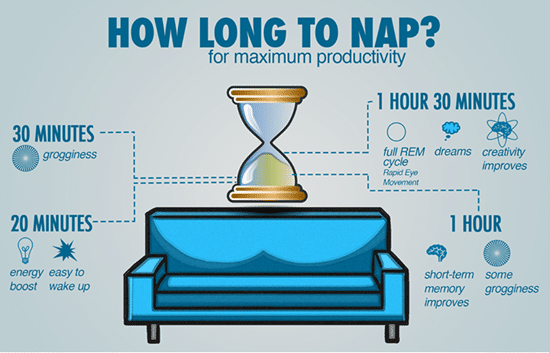"Dream, Dream, Dream! Conduct these dreams into thoughts, and then transform them into action."
- Dr. A. P. J. Abdul Kalam
"Dream, Dream, Dream! Conduct these dreams into thoughts, and then transform them into action."
- Dr. A. P. J. Abdul Kalam
4 Sep 2024
Many of us decline power naps because we believe they may interfere with a restful night's sleep in the future. However, it might be advantageous to us.
Taking a nap in the afternoon is a common practice in many cultures. The Japanese are known to take "afternoon naps," or “hirune'', after lunch. The Spanish are also known to enjoy regular "siestas". Tech behemoths like Google, Samsung, and Facebook provide their employees with sleep pods in their workplaces so they can get some rest throughout the workday. A growing global trend is power sleeping. But is it really effective to take a little catnap during the day? Does it make you feel renewed and energized, or does it make you feel even more exhausted than before?
Studies indicate that taking regular naps is beneficial to the long-term functioning of our brains. According to a 2023 study by researchers at University College London (UCL) and the University of the Republic in Uruguay, taking regular naps may help keep our brains bigger for longer and increase their general health. The scientists examined information from 35,000 participants, ranging in age from 40 to 69, who were involved in a study conducted by UK Biobank, a biomedical database and research resource. They examined previously discovered DNA fragments linked to individuals who frequently take naps.
Those who napped frequently had brains that were more than 15 cubic centimeters (0.9 cubic inches) bigger than those of those who never napped during the day.

(Source: Google Images)
Timing is key for the perfect power nap. If you are going to have a nap, make sure you do it in the mid-afternoon and don't allow it to go on for longer than 20 minutes, says Morgan ( Kevin Morgan graduated in psychology from the University of Ulster before completing his doctoral research into sleep, hypnotic drug use and aging) . Your body is going to be more accommodating of daytime sleep between 2 pm and 4 pm as this is when there is a dip in the circadian rhythm and our body temperature drops, explains Morgan. If you try to nap in the morning your body temperature is still rising, meaning you feel more alert. You will have trouble sleeping at night if you put it off until too late in the day. It is very well known that a natural remedy is sleep for a lot of stress-related problems. Given our high level of evolution, mental capacity is essential. We require a lot of sleep at night because of this. Individuals who have trouble sleeping at night, like shift workers or parents of small children, will likely benefit from a time of controlled sleep during the day. For those who are able to nap, it's akin to using sleep as a resource that they can access whenever they choose. Yet that does not imply that we should all take naps.

(Source: Google Images)
We have a phrase: 'irresistible napping,'" referring to the nearly uncontrollable temptation to nod off during the day. According to this, if a person finds themselves unable to avoid taking naps on a daily basis, it may be a sign of a sleep disorder that requires professional attention. It might also indicate that they are not receiving enough sleep at night or that they have a serious case of insomnia that calls for medical treatment, such as untreated sleep apnea, narcolepsy, or severe insomnia. It's critical to keep in mind that naps are not a substitute for getting a regular, deep sleep at night.
The National Sleep Foundation states that if you are a healthy adult, you don't always require naps. Many adults don't want to take naps. However, a nap can be wise depending on how you're feeling in the afternoon. Individuals who find that naps are beneficial for them report that they provide them a creative boost that can increase their productivity in the second half of the day, extending the amount of time they can work efficiently and solve difficulties.
"Sleep is an investment in the energy you need to be effective tomorrow." — Tom Roth